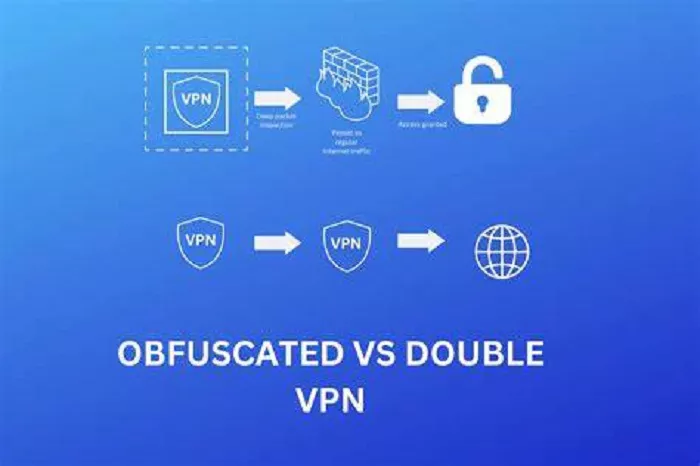When using a VPN service, you may encounter terms like “obfuscated servers” and “Double VPN.” These are advanced privacy features offered by premium VPN providers, but they serve different purposes and work in distinct ways. Understanding these differences helps you choose the right protection for your specific needs, whether you’re bypassing censorship or seeking maximum anonymity.
What Are Obfuscated Servers?
Obfuscated servers are specialized VPN servers designed to hide the fact that you’re using a VPN:
1. Basic Functionality
They disguise VPN traffic as regular HTTPS traffic
2. Primary Purpose
Bypass VPN blocks in restrictive networks (schools, workplaces, countries with censorship)
3. Technical Approach
Uses techniques like XOR obfuscation or SSL/SSH tunneling
4. Performance Impact
Typically causes moderate speed reduction (20-30%)
5. Common Use Cases
Accessing the internet in China, UAE, or other restrictive regions
What Is Double VPN?
Double VPN (also called multi-hop VPN) routes your connection through two VPN servers instead of one:
1. Basic Functionality
Your traffic gets encrypted twice by two separate servers
2. Primary Purpose
Provides extra layers of encryption for maximum privacy
3. Technical Approach
Routes traffic through two different servers in sequence
4. Performance Impact
Causes significant speed reduction (50-70%)
5. Common Use Cases
Journalists, activists, or anyone needing extreme anonymity
Key Differences Between Obfuscated Servers and Double VPN
These features address different security needs:
1. Primary Objective
Obfuscation: Hide VPN usage | Double VPN: Enhance encryption
2. Technical Implementation
Obfuscation: Modifies traffic appearance | Double VPN: Adds encryption layers
3. Speed Impact
Obfuscation: Moderate slowdown | Double VPN: Significant slowdown
4. Best For
Obfuscation: Bypassing restrictions | Double VPN: Maximum privacy
5. Detection Difficulty
Obfuscation: Hard to detect as VPN | Double VPN: Obvious VPN use but more secure
When to Use Obfuscated Servers
Choose obfuscation in these scenarios:
1. In Censored Countries
China, Iran, Russia, UAE where VPNs are restricted
2. On Restricted Networks
Schools, workplaces, public Wi-Fi that block VPNs
3. For Streaming Access
When platforms like Netflix block standard VPN connections
4. During Political Events
When governments increase internet surveillance
When to Use Double VPN
Opt for Double VPN in these situations:
1. Handling Sensitive Data
Whistleblowing or confidential communications
2. Extreme Privacy Needs
When you need to ensure no single point of failure
3. Avoiding Correlation Attacks
Preventing anyone from linking your entry and exit traffic
4. Journalistic Work
Protecting sources in high-risk environments
Performance Comparison
Understanding the speed trade-offs:
1. Connection Speed
Obfuscated: 70-80% of original speed | Double VPN: 30-50% of original speed
2. Latency
Obfuscated: Adds 20-50ms | Double VPN: Adds 100-200ms
3. Bandwidth Impact
Obfuscated: Moderate reduction | Double VPN: Significant reduction
4. Server Availability
Obfuscated: Fewer specialized servers | Double VPN: Can combine any two servers
Security Level Comparison
How each technology protects you:
1. Encryption Strength
Obfuscated: Standard VPN encryption | Double VPN: Double-layer encryption
2. Anonymity Level
Obfuscated: Hides VPN use | Double VPN: Hides origin better
3. Protection Against
Obfuscated: DPI and VPN blocks | Double VPN: Traffic correlation
4. Logging Risks
Obfuscated: Single server sees your IP | Double VPN: Split between two servers
Can You Use Both Together?
Some VPN service providers allow combining these features:
1. Technical Possibility
Yes, but extremely slow
2. Practical Usefulness
Only for extreme cases needing both censorship bypass and maximum privacy
3. Provider Availability
Few VPNs offer this combination
4. Performance Impact
Speed reductions multiply (80-90% slower)
Choosing the Right Option
Decision factors for users:
1. Your Primary Need
Bypassing blocks vs. enhancing privacy
2. Your Location
Restrictive country vs. privacy-focused needs
3. Your Activities
Streaming vs. sensitive communications
4. Your Device Capabilities
Older devices may struggle with Double VPN
Provider Availability
Not all VPNs offer both features:
1. Obfuscated Servers
NordVPN, ExpressVPN, Surfshark, VyprVPN
2. Double VPN
NordVPN, ProtonVPN, some enterprise solutions
Conclusion
Obfuscated servers and Double VPN serve fundamentally different purposes in the VPN world. Obfuscation helps disguise your VPN traffic to bypass restrictions, while Double VPN provides enhanced security through multiple encryption layers. For most users in censored regions, obfuscated servers offer the better solution, while Double VPN serves those with extreme privacy requirements. Understanding these differences allows you to make informed decisions about your online protection strategy based on your specific needs and circumstances.

